THE MYTH OF HAPPINESS
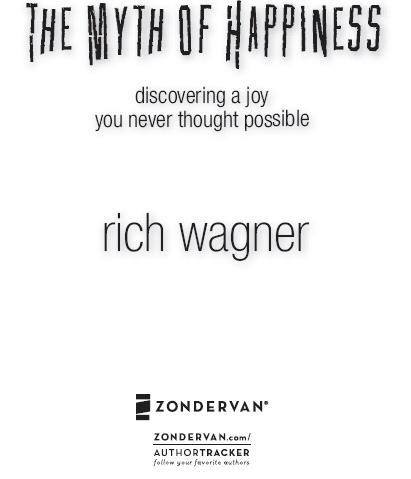
ZONDERVAN
THE MYTH OF HAPPINESS
Copyright 2007 by Rich Wagner
All rights reserved under International and Pan-American Copyright Conventions. By payment of the required fees, you have been granted the non-exclusive, non-transferable right to access and read the text of this e-book on-screen. No part of this text may be reproduced, transmitted, down-loaded, decompiled, reverse engineered, or stored in or introduced into any information storage and retrieval system, in any form or by any means, whether electronic or mechanical, now known or hereinafter invented, without the express written permission of Zondervan.
Mobi Edition June 2009 ISBN: 0-031-86318-X
Requests for information should be addressed to:
Zondervan, Grand Rapids, Michigan 49530
Library of Congress Cataloging-in-Publication Data
Wagner, Richard, 1966
The myth of happiness : discovering a joy you never thought possible
/ Rich Wagner.
p. cm.
Includes bibliographical references.
ISBN-13: 978-0-310-27487-2
1. Joy Religious aspects Christianity. 2. Christian life. I. Title.
BV4647.J68W35 2007
248.4 dc22
2006037565
All Scripture quotations, unless otherwise indicated, are taken from the Holy Bible, Todays New International Version. TNIV. Copyright 2001, 2005 by International Bible Society. Used by permission of Zondervan. All rights reserved.
The website addresses recommended throughout this book are offered as a resource to you. These websites are not intended in any way to be or imply an endorsement on the part of Zondervan, nor do we vouch for their content for the life of this book.
All rights reserved. No part of this publication may be reproduced, stored in a retrieval system, or transmitted in any form or by any means electronic, mechanical, photocopy, recording, or any other except for brief quotations in printed reviews, without the prior permission of the publisher.
Published in association with the literary agency of Alive Communications, Inc., 7680 Goddard Street, Suite 200, Colorado Springs, CO 80920.
07 08 09 10 11 12  23 22 21 20 19 18 17 16 15 14 13 12 11 10 9 8 7 6 5 4 3 2 1
23 22 21 20 19 18 17 16 15 14 13 12 11 10 9 8 7 6 5 4 3 2 1
With joy to Kimberly and the J-boys
CONTENTS
In writing this book, I am deeply indebted to three heroes of mine Oswald Chambers, C. H. Spurgeon, and C. S. Lewis. Each of these great Christian thinkers has had a profound influence in my understanding of what biblical joy is.
I was blessed to be surrounded by many lumps of sunshine, as Spurgeon would say, who have shared their joy with me. Deepest thanks to Bruce Marciano, Mitch Lamotte, Karen Blackmer, Donovan Donaldson, Linda Goehle, Judy Benoit, Clint Frank, and John Vedoe for providing me a glimpse into what real joy looks like.
Rev. Joseph Wagner proved a great sounding board and was the primary driver behind the discussion guide. Thanks, Dad! Thanks also to Angela Scheff at Zondervan for her input on the initial draft and for challenging me to produce a better, more personal book. Many thanks to Verlyn Verbrugge for his editorial strength and keen attention to detail.
For every book I write, my wife, Kimberly, is always the first person to read my drafts and is my first line of feedback. I wouldnt know how to write anything without her 24/7 support. I thank her and my three boys, Jordan, Jared, and Justus, for their constant encouragement and prayers.
All of the personal stories in the book are true. However, in some cases, I changed the names to preserve confidentiality.
Rich Wagner
October 2006
PART 1
THIRSTY FOR MORE
I want something else to get me through
this semi-charmed kind of life.
Third Eye Blind, Semi-Charmed Life
I think Ive been asleep most of my life.
Claire Colburn, Elizabethtown
Thirst. Seek. Settle. For nonbelievers and believers alike, much of life in todays world can be summed up with those three verbs. When you are young and motivated, you thirst for a great career, terrific spouse, or a chance to make a difference in the world. You graduate from school, and then you spend the next few years in pursuit of that dream.
The vast majority of people, however, never reach the lofty heights that they set out for. Their career stalls. They discover theyre not as talented as they thought or never got the lucky break they deserved. Even marriage and home life turn out to be a letdown. Consequently, at some point in their thirties or so, many people begin to settle; they adjust to their new less-than- perfect reality and make the best of it for awhile.
As people approach middle age, however, something happens. A midlife crisis for some, a reawakening for others. Whatever you call it, many people wake up from their stalled life and begin to thirst again. Through career changes, divorces, and fancy toys, people try once more to find happiness while there is still time left to enjoy it. These rekindled fires rarely last, however. They fizzle out in time, and people find themselves resigning once more, coasting into retirement.
When I look at unbelievers around me, I can easily spot this cycle in their lives. I hear rumors that my depressed, middle-aged neighbor is turning into an alcoholic. In his eyes, I see shades of the doomed soul in The Screwtape Letters who said, I now see that I spent most of my life in doing neither what I ought nor what I liked.
But if I leap off of my lofty perch and candidly look at myself and other believers around me, I wonder how much better off we are than the rest of the world. Author Tony Campolo points out, Most Christians I know have just enough of the Gospel to make them miserable, but not enough to make them joyful. I agree. All too often, we seem to be following the same cycle of thirsting, seeking, and settling. As much as we believe in our head that Christ transforms us into a new creation, something seems lacking in our heart. We hear sermons on Sunday exhorting us to live an abundant Christian life, but come Monday morning, we find ourselves living a semi-charmed kind of life. In the end, a happy, joy-filled life becomes something that we think of as a future gig, attainable only in eternity.
Yet when I open up my Bible, I never find the Christian life described as anything half-baked. Christ doesnt talk much about happiness, but I see the promise of joy repeated constantly throughout the New Testament. Jesus tells his followers that when we follow him, our joy will be complete (John 15:11). He even tells us that well leap for joy (Luke 6:23). Paul explains that the Holy Spirit will produce a lasting joy inside of us (Gal. 5:22 23), making it a key trait of our faith. Thats why he can confidently tell the Philippians to be joyful always (Phil. 4:4, NIV) and the Thessalonian church to rejoice always (1 Thess. 5:16). Peter has his say as well, pointing out that when we believe in Christ, we are filled with an inexpressible and glorious joy (1 Peter 1:8).
But if Jesus and the apostles are correct, why are so many believers struggling with something I call a joy gap a separation between the promises of Scripture and the very real letdown they experience in their daily lives? I can see only two explanations. Either the Bible hypes joy and offers us an unrealistic portrait of its practical impact, or we are somehow missing out, leaving Gods precious gift unclaimed.
I am convinced that the source of this joy gap rests firmly on our shoulders. Simply put, we are confused by joy. We fail to grasp what joy really is, how it differs from happiness, what it is not, and how it can be fully experienced in our lives. In fact, Ive come to look at joy being spoken of in Christian circles in the same way that the word
Next page
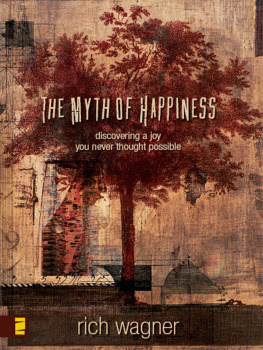

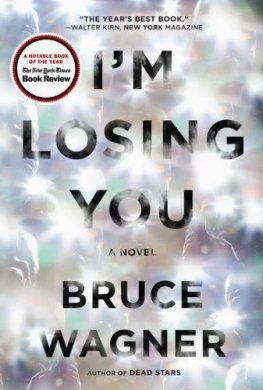





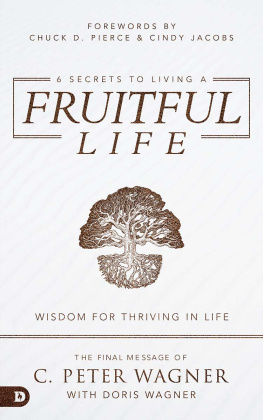
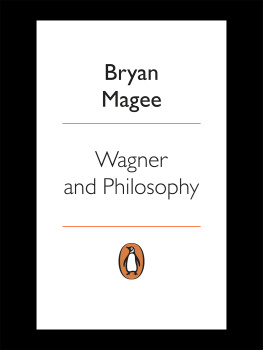
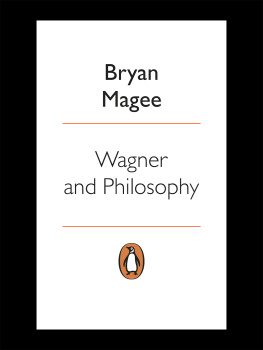

 23 22 21 20 19 18 17 16 15 14 13 12 11 10 9 8 7 6 5 4 3 2 1
23 22 21 20 19 18 17 16 15 14 13 12 11 10 9 8 7 6 5 4 3 2 1